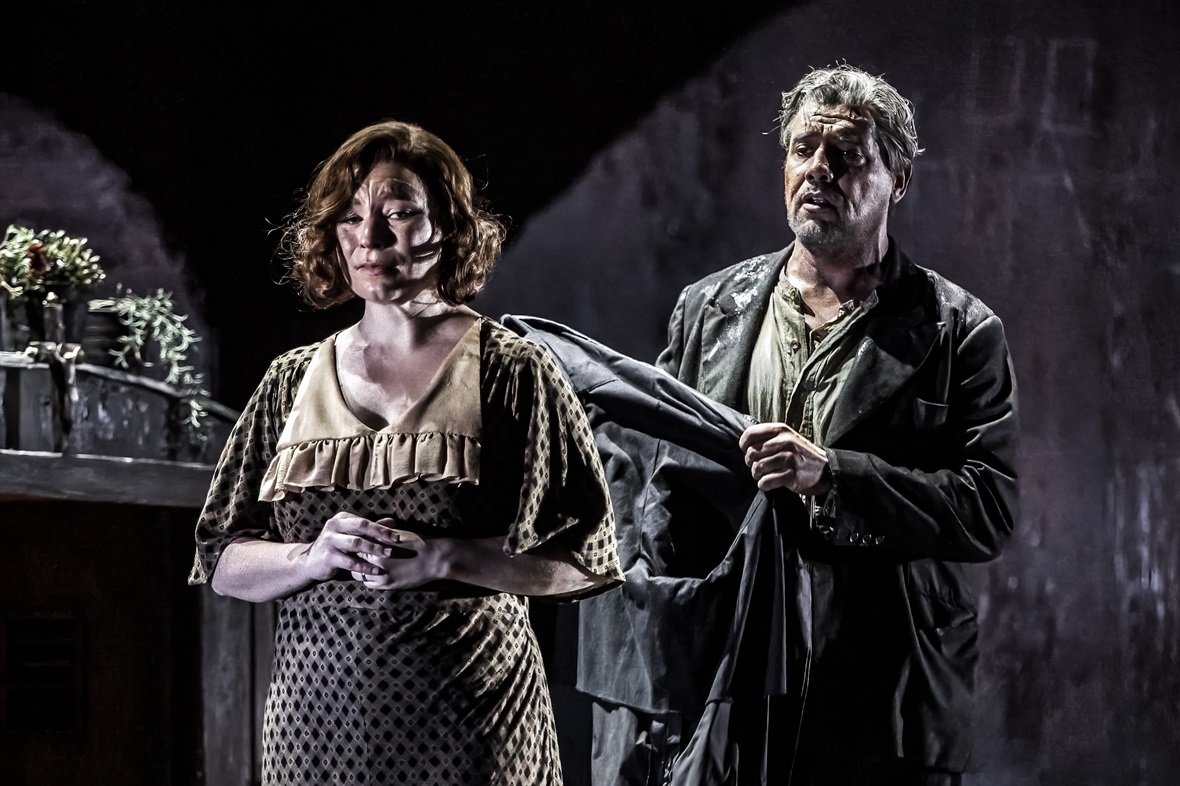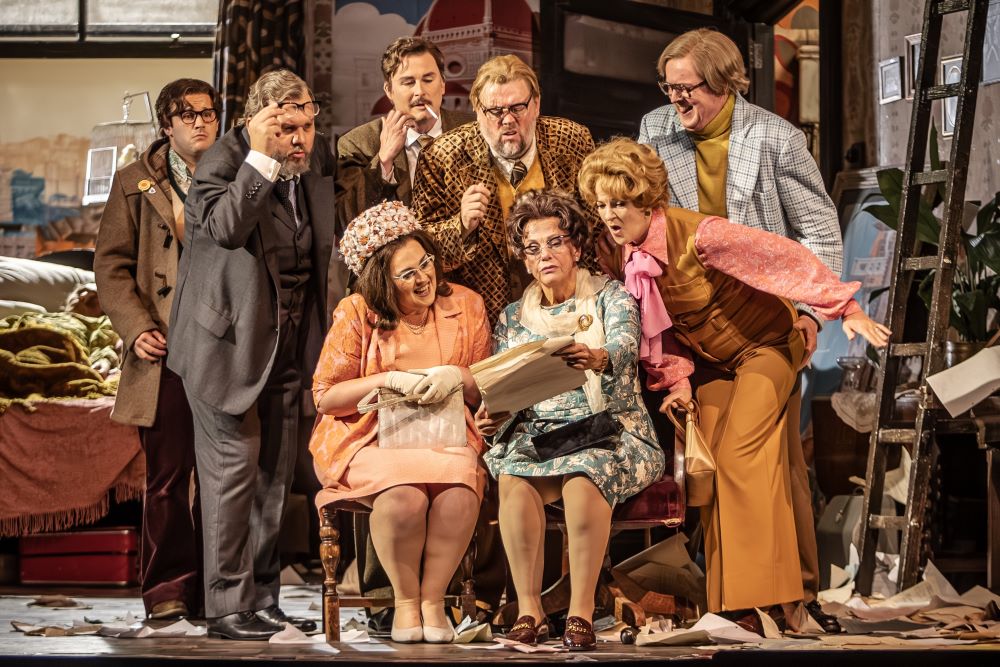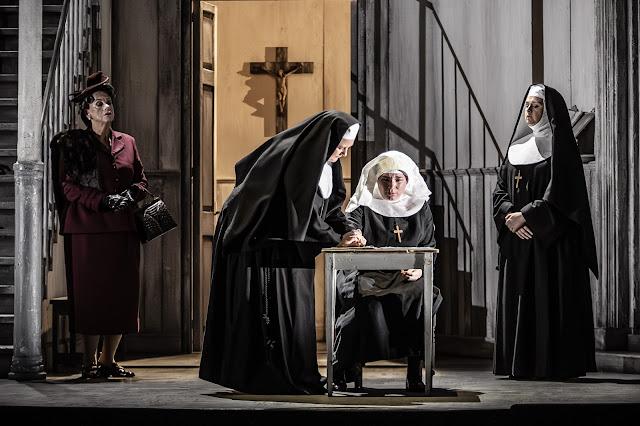This revival of Puccini’s Trittico a mere three and a half months after it was first shown on the Millennium Centre stage seems to bear witness to WNO’s current financial uncertainty. In effect, it reduces their 2024 repertory to half what it was a decade ago – four shows instead of eight, though admittedly all four productions have been new, at least to this company.
The problem was also to some extent compounded by the number of empty seats at Sunday’s first night. For most Bohème-lovers, no doubt, one Trittico a year might seem plenty. But there they will have been mistaken, not just because David McVicar’s production of the three one-acters was, and remains so memorable, but because the fairly substantial recastings include two or three outstanding individual performances that I, for one, would not want to have missed. Natalya Romaniw’s Giorgetta (pictured above with Dario Solari) in Il Tabarro is not only beautifully and stylishly sung, but – like Alexia Vougaridou in the June performances – she catches the nuances of a character that is very far from your average put-upon verismo heroine. This is excellent and very moving, opposite Dario Solari’s touchingly bewildered Michele, and in duet with Andrès Presno’s eloquent if slightly thin-toned Luigi. I said it in June and I’ll say it again here: even if Toscanini disliked it, Il tabarro, when sensitively directed and sung, as here, is a minor masterpiece.
Natalya Romaniw’s Giorgetta (pictured above with Dario Solari) in Il Tabarro is not only beautifully and stylishly sung, but – like Alexia Vougaridou in the June performances – she catches the nuances of a character that is very far from your average put-upon verismo heroine. This is excellent and very moving, opposite Dario Solari’s touchingly bewildered Michele, and in duet with Andrès Presno’s eloquent if slightly thin-toned Luigi. I said it in June and I’ll say it again here: even if Toscanini disliked it, Il tabarro, when sensitively directed and sung, as here, is a minor masterpiece.
Romaniw’s Sister Angelica in Puccini’s second panel is, almost literally, out of this world. Suor Angelica is to my mind the problem piece of Il trittico, but however much the score may drag for its first 40 minutes, Angelica’s final Liebestod scene with her dead seven year-old son, and complete with heavenly children’s chorus, is an opportunity for a great soprano which Romaniw does not let slip. Her control here, her variety of colour and, above all, her stage presence, which ensured that a scene that can be unbearably mawkish comes across as genuinely moving and, in its modest way, even redemptive: all this is superb.  Dario Solari also shines as Gianni Schicchi in the final panel (the relatives reading the will pictured above). This is not a part that rewards downstage star quality; it needs wit, timing, quickness of voice and movement. Its most lyrical moment, the “Farewell to Florence” threat to Boso’s relatives if they spill the beans on his will fraud, is satire. Solari, in any case, is well on top of it all, and he even gets right the most difficult bit of all: what to do with his face and hands while his daughter Lauretta (the sweet-voiced Haegee Lee as before) sings her show-stopping but also not quite serious “O mio babbino caro.”
Dario Solari also shines as Gianni Schicchi in the final panel (the relatives reading the will pictured above). This is not a part that rewards downstage star quality; it needs wit, timing, quickness of voice and movement. Its most lyrical moment, the “Farewell to Florence” threat to Boso’s relatives if they spill the beans on his will fraud, is satire. Solari, in any case, is well on top of it all, and he even gets right the most difficult bit of all: what to do with his face and hands while his daughter Lauretta (the sweet-voiced Haegee Lee as before) sings her show-stopping but also not quite serious “O mio babbino caro.”
Comparisons are odious, so for the rest I will only say that the minor castings, when different, are all equally successful, and the productions move with the same swing as before, a slow swing in Il tabarro, a gentle swing in Suor Angelica, a breathtaking swing in Gianni Schicchi. I might wish that Rinuccio, in this last, were less wimp, more cocky teenager, but that’s McVicar and his clever revival director, Greg Eldridge, and Trystan Llŷr Griffiths does and sings cleverly what is required. Anne Mason is suitably repulsive, if a shade under-voiced, as Angelica’s princess aunt, but her Zita in Gianni Schicchi is precise and the perfect focus for this family to end all families.
Alexander Joel conducts solidly, a couple of tricky moments in Il tabarro aside, and draws lovely playing from the orchestra, especially, again, in Il tabarro, one of Puccini’s most imaginative scores in terms of instrumental colour. As for the WNO chorus, I can only praise them as individuals, since they supply many of the minor parts but don’t sing as a choir. That in itself is of course a tribute. Let’s continue to value them accordingly.














Add comment